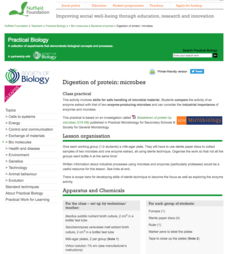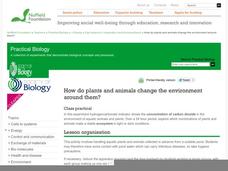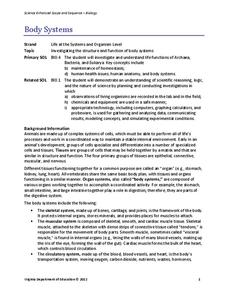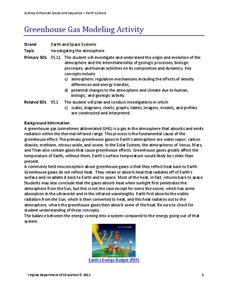Nuffield Foundation
Investigating Factors Affecting the Heart Rate of Daphnia
What variables change heart rate? Young scientists observe the beating heart in Daphnia to understand these variables. They make changes in temperature, chemicals, and other factors as they graph the heart rates. Analysis questions help...
Nuffield Foundation
Assessing Human Hearing
Young scientists explore hearing through multiple experiments, demonstrations, and activities. They focus on the changes in hearing over a lifetime, how we can determine where a sound is coming from, and the ability to filter noises.
Nuffield Foundation
Investigating How We See Colour
Can you eyes be fooled into seeing colors that aren't actually there? Budding scientists view a presentation that addresses this topic. They explore how their eyes interpret color through the retinas and messages sent to the brain. They...
Nuffield Foundation
Digestion of Protein: Microbes
Milk the resource for all it's worth. Young biologists perform assay techniques to test the digestion of protein. They place bacterial samples, fungal samples, trypsin solution, and distilled water on a milk-agar plate to see the effects...
Curated OER
How Do Plants and Animals Change the Environment Around Them?
If you have elodea and snails in your classroom aquarium, or if you have access to a pond with these organisms, your young biologists can set up a controlled experiment to determine how certain ecosystems respond in light and dark...
Virginia Department of Education
Body Systems
The human body is an amazing thing! Explore the body with your high school class as they investigate each system in detail. They learn components of each organ system and disease processes that can negatively affect general health and...
Virginia Department of Education
Mendelian Genetics
How did Mendel know which pea plants would demonstrate certain characteristics? Pupils explore the answer this question, among others, as they complete Punnet squares, research dominant and recessive traits, and explore hereditary...
Virginia Department of Education
Meiosis
Intrigue the class by completing a lesson on meiosis, filled with challenging and insightful activities to spark the interest of every person in the room. Each member of the class learns about genetic disorders due to faulty meiosis, and...
NOAA
Watch the Screen!
Can a sponge cure cancer? Life science pupils visit the drugstore under the sea in the fifth lesson of six. Working groups research the topic then get hands-on experience by testing the inhibiting effects of several plant extracts on E....
NASA
Producers Make Their Own Food
During an inquiry-based lesson, scholars decide which variable to test and then design an experiment to determine the needs of producers. After two weeks, they complete a full analysis and research paper.
NOAA
Importance of Deep-Sea Ecosystems – What Killed the Seeds?
Most drugs used today come from nature, so the discovery of new ecosystems in the deep sea is exciting from a medical perspective. Scholars develop their own bioassay to test germination rates in seeds.
Howard Hughes Medical Institute
Got Lactase? The Co-Evolution of Genes and Culture
Does the human body evolve as quickly as human culture? With a stellar 15-minute video, explore the trait of lactose intolerance. Only about 1/3 of human adults seem to still have the enzyme lactase and therefore, the ability to digest...
SRI International
Nanofiltration
How can everyone in the world have access to clean drinking water? Throughout the lesson, learners read about and listen to how water is filtered, what the filtration process removes, and the best ways to filter. They explore the...
Worchester Polytechnic Institute
Interactive Laboratory Activities for Secondary Education
Do you think the lab smells like rotten eggs? Sorry to hear about your sulfering. A set of five experiments covers many different topics including seasons, gravity, food, precipitation, and photosynthesis. Though not presented as a...
Serendip
Photosynthesis Investigation
Can scientists increase the rate of photosynthesis to help clean the air? Scholars complete an experiment determining net photosynthesis. Then, they apply knowledge from the activity to design their own investigations of the factors that...
Curated OER
Investigating the Effect of Minerals on Plant Growth
How do different minerals affect the growth of plants? Budding botanists find out in a multi-week experiment that has them using solutions with specific mineral deficiencies. While there is a lot of preparation for the investigation,...
NOAA
What Killed the Seeds?
Can a coral cure cancer? Take seventh and eighth grade science sleuths to the underwater drugstore for an investigation into emerging pharmaceutical research. The fifth installment in a series of six has classmates research the wealth of...
Kenan Fellows
Unit 2: DNA Analysis
Ever wonder how they solve those mysterious murders in TV crime dramas? The second of four units in a Biotechnology series introduces scholars to the many methods of DNA analysis. Pupils create and run their own gel electrophoresis...
Virginia Department of Education
Greenhouse Gas Modeling Activity
Why are greenhouse gases called greenhouse gases? Young Earth scientists learn about greenhouse gases though experimentation in the second installment of a 3-part series. They use lamps to model radiant energy as well as warming through...
It's About Time
The Fossil Record
What do you call a plated dinosaur when he is asleep? A stego-snorus! Through four hands-on activities, young paleontologists rotate through stattions to learn about preservation in rock, resin, ice, and conservation of animal tracks....
NOAA
Off Base
How does carbon dioxide affect the world's oceans? The final installment in a series of six lessons has pupils research ocean acidification, then conduct an experiment to witness the delicate balance that exists in our seas. Materials...
National Nanotechnology Infrastructure Network
The Effects of Gold and Silver Nanoparticles on Brine Shrimp: A Toxicology Study
Who doesn't love gold and silver? Brine shrimp, that's who! Learners conduct an experimental lesson to monitor the toxicity of gold and silver nanoparticles on brine shrimp. They synthesize solutions to expose the brine shrimp to and...
Nuffield Foundation
Enzyme-Catalysed Synthesis
Enzymes: not just for breaking chemicals apart. Young biologists perform an experiment on potatoes. They first remove starch from potato extract. They then add the resulting liquid to samples of glucose-1-phosphate, glucose, maltose, and...
Curated OER
Investigating What Makes Fruit Go Brown
Is there anything that can be done to slow the browning of fruit once it has been cut? High schoolers determine the answer through five different investigations involving apples, potatoes, and chemical reactions. After each experiment,...
Other popular searches
- Molecular Biology
- Plant Biology
- Biology Lab
- Biology Lesson Plans
- Biology Unit
- Introduction to Biology
- Population Biology
- Biology Crossword
- Biology Calculus
- Biology Vocabulary
- Ap Biology
- Biology Lab Photosynthesis

























